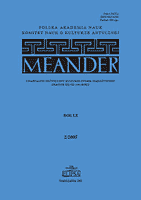Nauka i magia w Historii naturalnej Pliniusza Starszego, czyli o prawie sympatii
Science and Magic in Pliny the Elder’s Natural History
Author(s): Justyna MigdałSubject(s): Language and Literature Studies
Published by: Komitet Nauk o Kulturze Antycznej Polskiej Akademii Nauk
Keywords: Latin literature; magic; Pliny the Elder
Summary/Abstract: In his Natural History Pliny the Elder aims at presenting various philosophers’ views on science and at showing his readers the force of nature. He not only follows the Stoics in regarding god and nature as identical, but also makes use of their notions of sympathy and antipathy that are for him the most important laws of nature. In his system, sympathy and antipathy have the same function as laws of physics and the other sciences in our time. Pliny puts a special emphasis on medicine which, in his view, is a science largely neglected by the Romans, though much needed by them. In order to give people means to cure diseases, he does not hesitate to quote instructions found in textbooks of magic, seeing that medicine is often helpless. He does not, however, trust magic. On the contrary, he believes it to be a false and dangerous art, which arose as a corruption of religion, astrology and medicine. Just as the genuine sciences, magic is based on laws of sympathy, but it misuses them. For Pliny violation of the laws of nature is a crime, and that is why he strongly condemns magic. The Natural History presents a consistent image of the world ruled by sympathy. Though many scholars regard Pliny as superstitious, credulous and unfit for methodical research, in truth, however, he proves to be a rationalistic explorer of the universe and admirer of nature.
Journal: Meander
- Issue Year: 60/2005
- Issue No: 2
- Page Range: 184-203
- Page Count: 20
- Language: Polish

